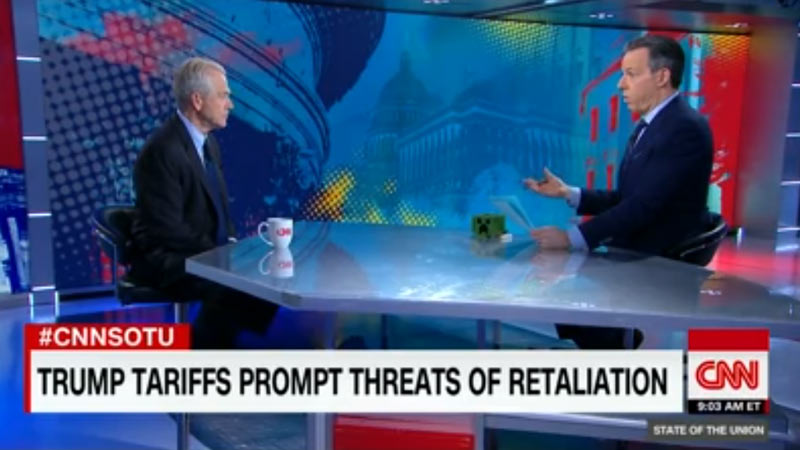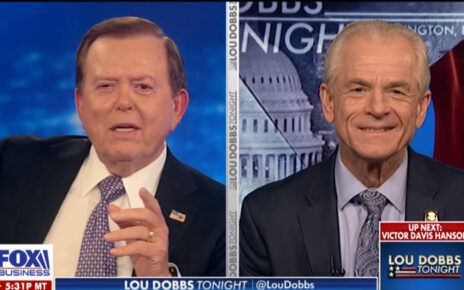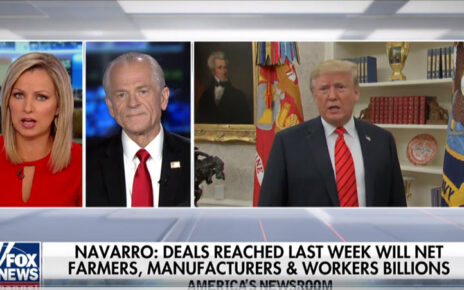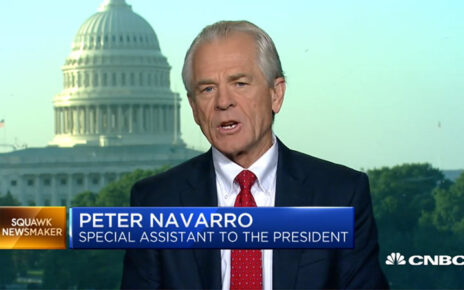March 4, 2018 – CNN, State of the Union
White House trade adviser Peter Navarro is pressed by CNN’s Jake Tapper on President Trump’s decision to impose tariffs on steel and aluminum imported into the United States.
TAPPER: Let’s go right to the director of the White House Office of Trade and Manufacturing Policy, Peter Navarro.
Thanks so much for being here. Really appreciate it.
PETER NAVARRO, DIRECTOR, WHITE HOUSE OFFICE OF TRADE AND MANUFACTURING POLICY: Great to be here with you.
TAPPER: So let me just ask you some — some basic questions about these tariffs. When do you think they’re going to go into an effect?
NAVARRO: We expect, sometime next week, the Office of Legal Counsel will put form and legality on the proclamations and the president will sign them.
TAPPER: Sometime this week coming up?
NAVARRO: I — I would think so, towards the end of the week. At the latest, it would be the following week.
Basically, we want to be very careful, dot the I’s, cross the T’s, make sure we go through all the final legal hoops, and that’s where we are now. TAPPER: And one of the other big questions, and I think a lot of
people on — on Wall Street and throughout the manufacturing community are curious about, are there going to be any exemptions for these tariffs. Or are they just going to be blanket 25 percent tariffs on all imported steel, blanket 10 percent on all imported aluminum?
NAVARRO: So — so let’s go back to — to Thursday, which I — I thought was a quintessential and great event at the White House with — with the president.
The president was getting ready to make his final decision and wanted to touch base with the executives in the aluminum and steel industry, and so he brought them into the Cabinet Room.
And we had a wonderful discussion about the options on the table. And the general consensus in the room the president heard was tariffs, rather than quotas, and that they should be across the board with no country exemptions.
The president heard that loud and clear. There are some really good reasons for doing all that. And that’s the direction the president took at the end of the meeting.
TAPPER: So, there’s going to be no exemptions? That’s what it’s going to look like at the end of the week?
NAVARRO: Well, there’s a difference between exemptions and country exclusions. There will be an exemption procedure for particular cases, where we need to have exemptions, so that business can — can move forward.
But, at this point in time, there will be no country exclusions.
TAPPER: President Trump has pointed to Chinese overproduction of steel as one of the major reasons for the tariff. Take a listen.
(BEGIN VIDEO CLIP)
TRUMP: I will make a decision that reflects the best interests of the United States, including the need to address overproduction in China and other countries.
You have countries that are so overproducing. And what they’re doing is, they’re dumping it on us.
(END VIDEO CLIP)
TAPPER: China only accounts for 2 percent of U.S. steel imports. It’s not even in the top 10 importers of steel in this country.
[09:05:00]
And I think there are a lot of allies of the U.S., especially perhaps Canada and South Korea, who are saying, this is going to hurt us — U.S. allies Canada and South Korea — much more than it’s going to hurt China. NAVARRO: So, the bigger picture here is that China has — has
tremendous overcapacity in both aluminum and steel.
And so what they do is, they flood the world market with this product. And that ripples down to the — to our shores and to other countries. And so China is, in many ways, the root of the problem in both aluminum and steel for all countries of the world.
But — but let’s be clear here about what the president’s doing. Let’s lay this on the table.
This is an action, basically, to protect our national security and economic security. And the president was quite clear. We can’t have a country that can defend itself and prosper without an aluminum and steel industry.
TAPPER: I have a lot of questions for you about this national security exemption.
One of them, of course, you’re — you’re — you’re invoking it — World Trade Organization rules say this action can only be legally imposed using the national security exemption.
The Pentagon wrote a memo about the tariff, saying, indeed, the unfair steel practices do create a national security problem. But the Pentagon also said that the U.S. should use targeted tariffs and avoid angering allies who are needed for other diplomatic national security reasons, such as Canada, such as South Korea.
If you are invoking the national security exemption, should you not also be listening to the Pentagon on how to apply these tariffs?
NAVARRO: What I love about this president is, he listens to all points of view, both within his government and outside, and then he makes the tough decisions.
And, in this case, he made the decision to with 25 percent tariffs on steel, 10 percent on aluminum across the board, with no country exclusions.
And — and that’s the way to do it, I believe, because simply that — for example, a 10 percent tariff on aluminum, and to start — as soon as you start exempting countries, you have to raise the tariffs on everybody else.
As soon as you exempt one country, then you have to exempt another country. And — and so it — it’s a slippery slope. So — so I understand what the Pentagon said. The president understands it very clearly. He heard all sides. And he made a decision, like I said, courageous, tough decision, and I think it’s the right decision.
TAPPER: From the perspective of Canada — let’s just do that, because they are the number one importer in the U.S. of steel.
NAVARRO: Sure. TAPPER: Canada would say, national security exemption? We fight with you in every war. Our soldiers are right next to your soldiers in every conflict. What possible scenario can you envision where we wouldn’t supply you with steel and aluminum?
NAVARRO: So, let’s go back what the 232 does.
When we talked about it just a few minutes ago, we said national security and economic security, broadly defined. And that includes having a strong manufacturing in the defense industrial base inside our borders, Jake, inside our borders.
And so, in the aluminum case, we have a situation now where import penetration is over 90 percent. We are — we are literally on our last legs. And Canada is 40 percent of the market. And if you exempt Canada, then you have to put big, big tariffs on everybody else.
So, this is — this is a — a measured, targeted approach.
TAPPER: Lawrence Kudlow, Arthur Laffer, Stephen Moore, three of them — all three of them, economists, big supporters of President Trump, campaigned advisers to President Trump, they wrote in a CNBC article this weekend — quote — “President Trump genuinely believes that his steel and aluminum tariffs will save thousands of blue-collar jobs, but even if tariffs save every one of the 140,000 or so steel jobs in America, it puts at risk five million manufacturing and related jobs in industries that use steel.”
And this is an argument that you hear from a lot of Republicans. Your — you might be protecting 140,000 Americans and hurting millions more.
NAVARRO: Sure.
And I know Larry. I know Steve. We were brothers in arms during the campaign. And I’m totally in sync with them, as the president is, on things like deregulation and tax cuts.
But Larry and Steve have never, ever supported the president on trade. And when the president ran against 16 other Republican candidates, all 16 of those candidate didn’t — didn’t embrace his trade agenda either.
And guess what? He beat them.
So, Larry, Steve, they can have their — their points of view, and I agree with that, but they’re dead wrong on the economics, because there’s no downstream effects here. There’s only the president, for national security and economic security purposes, saving and defending our steel and aluminum industries.
And, as the president said, we can’t have a country without those industries. And I believe that.
TAPPER: One last question for you, sir. The last time something like this was attempted, they were much more
targeted steel tariffs by the Bush administration in 2002. Europe and others complained to the World Trade Organization. The World Trade Organization threatened a $2 billion fine.
[09:10:02]
You know all this. I’m just informing…
NAVARRO: I do.
TAPPER: I’m informing the viewers.
So, there’s every reason to believe that the WTO will object and try to take action against the United States.
Will the United States consider leaving the World Trade Organization under President Trump?
NAVARRO: What I think the president wants to do in terms of the World Trade Organization is send a very strong signal to them across the board on this issue of trade that we’re not going to take it anymore.
What we have is a country here in the United States, which has the lowest tariffs in the world, lowest non-tariff barriers in the world. And all we get from that is not fair and reciprocal trade from our trading partners.
What we get from that is a half-a-trillion dollars a year in trade deficits that put our wealth offshore and our jobs offshore. And a lot of the problem has been the World Trade Organization, which is over 160 countries. And a lot of them simply don’t like us.
And so we don’t get good results there. So, we want to — we — we’re — we’re free traders. Let’s — let’s be clear about that. Everyone in that White House is a free trader. But we are fair and reciprocal traders. And the World Trade Organization, I think, needs to change with the times.
TAPPER: If they don’t change, yes or no, is the Trump administration considering leaving the WTO?
NAVARRO: Jake, you know how — you know that’s a provocative question. That’s down the road.
(CROSSTALK)
TAPPER: Well, President Trump trashed the WTO in a speech yesterday.
NAVARRO: Yes, and — and rightly so, and rightly so.
TAPPER: Well, I’m just saying, it doesn’t come from nowhere.
(CROSSTALK)
NAVARRO: You know, the best-case scenario here is that the world wakes up to the fact that we’re not going to take it anymore, we want fair and reciprocal trade. And the World Trade Organization needs to adapt accordingly.
TAPPER: OK, but you’re not going to entertain the worst-case scenario. You’re just giving the best-case scenario.
Worst-case scenario, President Trump says to the WTO, we’re — we’re thinking about leaving?
NAVARRO: I — asked and answered.
TAPPER: OK.
Last question for you.
You’ve had major disagreements with the director of the National Economic Council, Gary Cohn, one of the president’s top economic advisers. It’s been reported he’s now mulling resignation after losing this disagreement with you over tariffs.
Would you be sad to see Gary Cohn go?
(LAUGHTER)
NAVARRO: That’s a great question.
Look, I was with Gary and — and the president Thursday afternoon. He was in great spirits. Gary and I actually get along very well. And we — we agree on more things than we disagree, for example, on deregulation, on tax cuts.
You may be surprised to know that we are perfectly aligned on the China question. So, Gary and I basically have very differing opinions. The president loves that. He wants to hear all sides of the argument.
So, he’s a valued member of the team. And it’s up to Gary whether he goes or stays, but I like working with the guy.
TAPPER: Peter Navarro, it’s always a pleasure. Thank you so much for being here.




